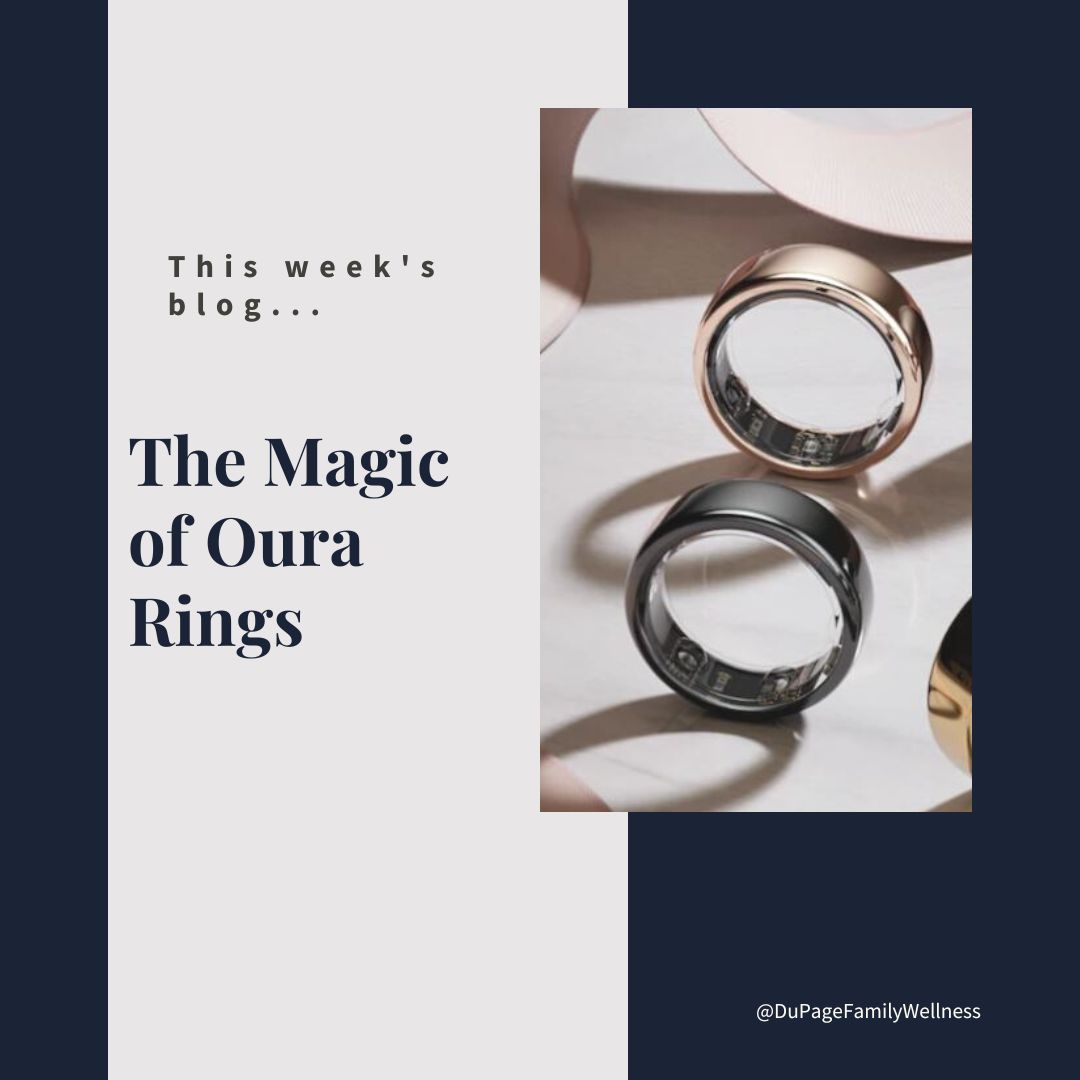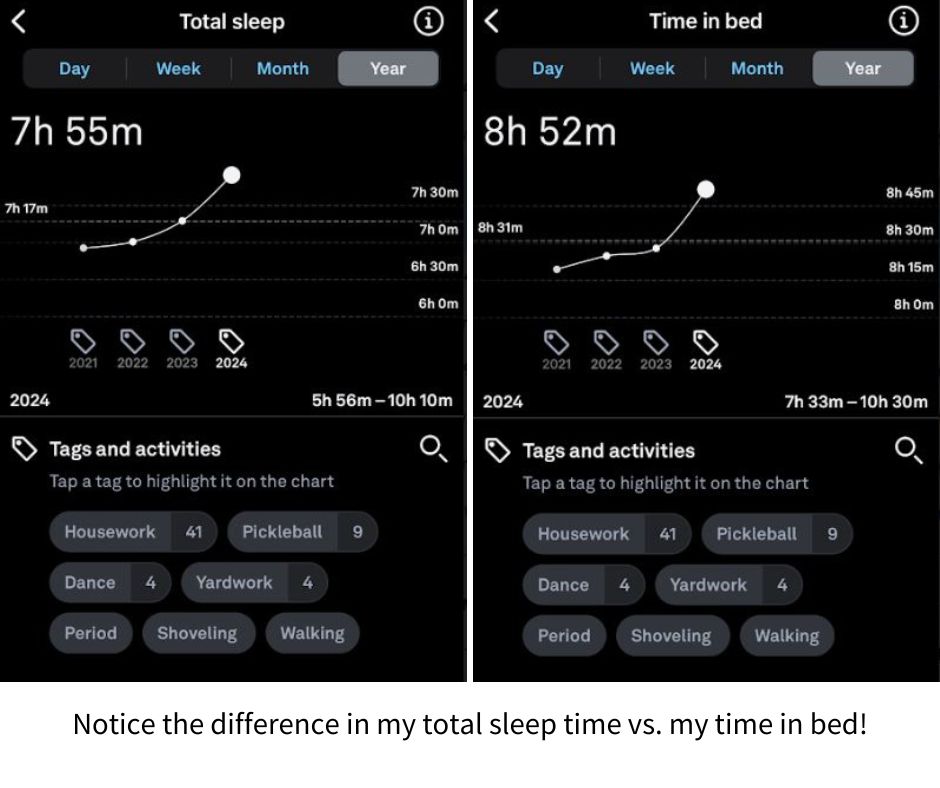 If you want to improve your sleep and feel better during the day, an Oura Ring can be a great tool. Its advanced sensor technology provides personalized sleep and health insights based on the most reliable source - your body.
If you want to improve your sleep and feel better during the day, an Oura Ring can be a great tool. Its advanced sensor technology provides personalized sleep and health insights based on the most reliable source - your body.
The information that my Oura Ring provides, helps me identify things that impact my sleep. It not only shows me the specifics of my sleep quality but also leads me to understand the changes needed for a better night’s sleep.
I have been using this device for almost 3 years. I use the insights gained on a daily, weekly, and monthly basis to make sure that my body is feeling great and to improve my overall health.
When I listen to these findings and make adjustments to my life, I wake up feeling more rested. It results in more energy and mental clarity which sets me up for a better day. This helps me care for myself and others more effectively.
I chose the Oura Ring over other wearable devices because of its accuracy in sleep detection, but I also use it for paying attention to my movement and my basal body temperatures for fertility tracking.
Let’s take a brief look at why sleep is important. Then we will take a look at this technology and what insights it provides.
Why Sleep is Important
You might intuitively know that you feel better when you are well-rested. Sleep is crucial for mood, energy, and stress tolerance. It is difficult to concentrate and react quickly when you are groggy. The pathways in your brain that let you learn and create new memories are dependent on sleep.
Sleep is also essential for the basic repair of the body. This includes the neurological, endocrine, immune, musculoskeletal, and digestive systems. Studies suggest that sleep also plays a housekeeping role in removing the toxins in your brain that build up during waking hours.
For more on the importance of sleep and how to get the quality rest you need, check out our blogs…
- Habits for a Great Night's Sleep
- Are You Getting Enough Sleep
- An Easy Way to Improve Your Sleep
- How to Get Sleep When You Have Little Ones
Measuring Sleep Quality
The Oura ring uses advanced sensor technology to measure your resting heart rate, heart rate variability, temperature, and respiratory rate. Its associated app tracks this data and uses it to assign three simple scores that answer questions about your health.
- How ready are you for the day? - Your "readiness score" provides a picture of your overall health and can signal when your body is under strain. You can use this score to track how your daily habits affect your wellness and make any necessary changes.
- How well did you sleep last night? - Your "sleep score" shows the quality of your sleep by measuring the length of time you were in bed, how fast you fell asleep, how long you were in each stage, as well as how much you tossed and turned during the night. This information can help you see trends and show you how caffeine, exercise, or screens affect your sleep.
- How well are you balancing your activity and rest? - Your "activity score" shows if you were sedentary that day, but also helps you gauge if you got enough recovery time. It looks at your activity goals, training frequency, time spent exercising as well as the number of rest days.
Data Collected Over the Years
The data collected throughout the past couple of years shows that ...
- I am currently sleeping an average of 59 minutes longer each night than I was in 2021.
- My sleep efficiency has improved from 83% in 2021 to 88% in 2024.
- My steps have gone from 10,000 per day in 2021 to over 12,000 per day in 2023.
Insights Gained From This Data
While the data is interesting, the important thing for me is taking this information to guide my decisions. By processing this data, I know...
- if I want 8 hours of sleep, I need to be in bed for 9 hours. It takes time for me to settle and fall into a good sleep. When I just allow eight hours in bed, I only end up with seven hours of actual sleep.
- it impacts my sleep quite a bit when I eat a heavy meal or drink wine. My sleep quality will be worse. I will have a lower heart rate variability and less time in REM sleep.
- where I am in my menstrual cycle. I can easily see the lower basal temperatures during the first half of my cycle followed by higher temperatures in the second half. This allows me to know when I ovulate which is an indication of when I may be able to get pregnant.
- what days to prioritize movement. If my movement is low on a certain day, I know to prioritize it the next day.
- when to go to bed early. If my sleep score is low one night, it is a good idea for me to plan an early bedtime the following night.

My Favorite Thing About My Oura Ring
As a science person, I love that the feedback given is based on objective data. I love that studies are showing the accuracy of the product's reading. When I feel tired, groggy, or lack mental clarity there is data to show me why this might be. Then I can experiment with these factors and see the difference it makes.
It gives me more motivation to make positive changes when the data is before me. The app provides suggestions that take the stress out of fixing problems with my sleep. There are still many factors that make sleep difficult, but this guides me to make informed decisions about this important aspect of my wellness.
If you are interested in seeing my Oura Ring, just ask at your next visit. I would be glad to talk with you more about my experience.
Dr. Jamie
P.S. If you are wondering how a little ring can give you accurate data, check out their blog How Accurate is Oura. And if you are ready to purchase one yourself, you can get $40 off if you purchase it at Shop Oura Rings.

